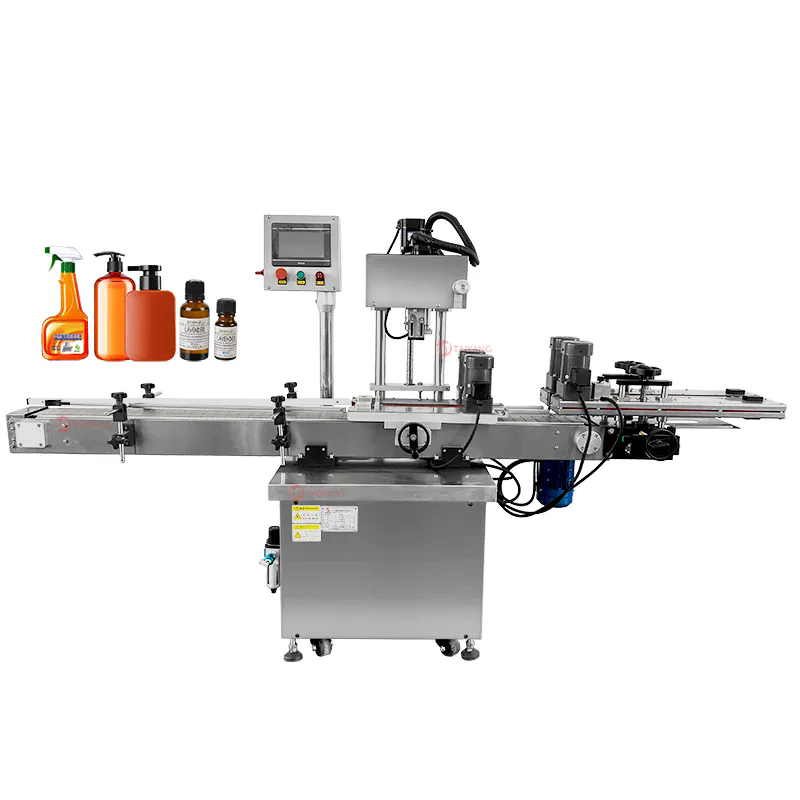What Makes a Capping Machine Essential in Modern Packaging?
2024-11-27
In industries like food, beverage, pharmaceuticals, and cosmetics, precision and efficiency are critical during packaging. A capping machine plays a pivotal role in sealing products securely, ensuring quality and safety. But what exactly is a capping machine, and why is it indispensable? Let’s uncover its significance.
What Is a Capping Machine?
A capping machine is a specialized piece of equipment designed to seal containers with caps, lids, or closures. It automates the capping process, ensuring consistent results and saving time. These machines are used in various industries to maintain product integrity, prevent leaks, and provide a professional finish.
Why Is a Capping Machine Important?
1. Efficiency and Speed:
Automating the capping process significantly reduces production time compared to manual methods.
2. Consistency:
It ensures uniform application of caps, enhancing product quality and appearance.
3. Product Safety:
Properly sealed containers protect products from contamination, leakage, and tampering.
4. Cost-Effectiveness:
By reducing labor costs and material waste, capping machines offer excellent long-term savings.
What Types of Capping Machines Are Available?
1. Automatic Capping Machines:
Ideal for large-scale production, these machines handle high volumes with minimal supervision.
2. Semi-Automatic Capping Machines:
Perfect for medium-scale operations, these require some manual intervention but offer flexibility.
3. Handheld Cappers:
Designed for small businesses, these portable tools provide basic capping functionality.
4. Specialized Cappers:
Custom machines designed for unique cap types, such as snap-on, twist-off, or pump caps.
How Does a Capping Machine Work?
1. Cap Feeding:
Caps are loaded into a hopper or feeder system, which organizes and delivers them to the application point.
2. Cap Placement:
The machine positions the cap onto the container using precise alignment mechanisms.
3. Sealing Process:
Depending on the machine type, caps are twisted, pressed, or snapped into place.
4. Inspection:
Advanced machines include quality control systems to ensure every cap is properly sealed.
What Industries Rely on Capping Machines?
1. Food and Beverage:
Used for sealing bottles, jars, and cans to preserve freshness and prevent spills.
2. Pharmaceuticals:
Ensures tamper-proof closures for medicines, maintaining safety standards.
3. Cosmetics:
Provides aesthetically pleasing and functional seals for lotions, serums, and sprays.
4. Chemical Industry:
Secures containers for cleaning agents, oils, and other liquids to avoid leaks.
What Factors Should You Consider When Choosing a Capping Machine?
1. Production Volume:
Choose a machine that matches your production scale to maximize efficiency.
2. Cap and Container Type:
Ensure compatibility with the shapes, sizes, and materials of your caps and containers.
3. Automation Level:
Determine whether your operations need a fully automated, semi-automated, or manual machine.
4. Ease of Maintenance:
Opt for machines with straightforward cleaning and servicing requirements.
5. Customizability:
Some machines can be adapted for future needs, offering greater flexibility.
How Are Modern Technologies Improving Capping Machines?
1. Smart Systems:
Advanced capping machines feature sensors and AI to detect and correct errors in real-time.
2. Energy Efficiency:
Newer models are designed to consume less power while maintaining high output.
3. Flexibility:
Machines now accommodate a wider range of caps and containers with minimal adjustments.
4. Eco-Friendly Options:
Innovations are making capping processes more sustainable by reducing material waste.
What Are the Benefits of Automating Your Capping Process?
1. Reduced Labor Costs:
Automation eliminates the need for manual capping, freeing up resources for other tasks.
2. Higher Throughput:
Automated machines handle high production demands efficiently.
3. Improved Accuracy:
Consistent application minimizes errors, reducing the likelihood of product recalls or complaints.
4. Scalability:
Automated systems can be easily upgraded to meet growing production needs.
How Can Proper Maintenance Extend the Life of a Capping Machine?
1. Regular Cleaning:
Prevents build-up of debris that could affect performance.
2. Lubrication:
Keeps moving parts functioning smoothly and reduces wear and tear.
3. Timely Repairs:
Addressing small issues early prevents costly breakdowns.
4. Staff Training:
Ensure operators know how to use and maintain the machine properly.
5. Scheduled Inspections:
Routine checks by professionals can identify hidden problems before they escalate.
Why Should You Invest in a Capping Machine?
For businesses looking to optimize their packaging processes, a capping machine is a game-changer. It enhances productivity, ensures consistent quality, and safeguards your products. Whether you’re operating on a small scale or managing large industrial operations, there’s a capping machine tailored to your needs.
Are you ready to elevate your packaging game? The right capping machine might be the solution you’re searching for!



